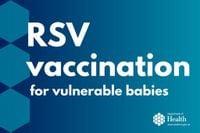Starting this autumn, Northern Ireland will extend its vaccination programme to include premature babies against respiratory syncytial virus (RSV), a common but potentially severe respiratory infection that affects young children and older adults. The new initiative introduces a long-acting injection called Nirsevimab, designed specifically for infants born very prematurely, who are often too early to benefit from the RSV vaccine given to pregnant women.
RSV infects about 90% of children by the age of two and remains a leading cause of hospitalisation in the first year of life. While the virus typically causes mild cold-like symptoms in adults and older children, it can lead to serious conditions such as bronchiolitis and pneumonia in infants, especially those born prematurely. The new injection aims to provide robust protection throughout the RSV season, which runs from September to February.
Nirsevimab offers over 80% protection against RSV and is administered as a single injection, a significant improvement over the current treatment, Palivizumab, which provides around 55% protection and requires up to five monthly doses. This shift to a long-acting monoclonal antibody follows advice from the Joint Committee on Vaccination and Immunisation (JCVI), which in February 2023 recommended its use for high-risk and very preterm infants born before 32 weeks’ gestation.
Health Minister Mike Nesbitt welcomed the approval of Nirsevimab by the Department of Health, noting that it aligns with vaccination strategies across other UK nations. He emphasized the serious risk RSV poses to very prematurely born children in their first winter and highlighted the vaccine’s role in strengthening winter preparedness. “This innovative vaccine further strengthens our winter preparedness to prevent avoidable hospital admissions and reduce pressures on GPs and Emergency Departments,” Nesbitt said. He encouraged parents and guardians of eligible infants to take advantage of the vaccine to protect their babies from illness.
Chief Medical Officer Professor Sir Michael McBride underscored the urgency of the vaccination programme in the context of declining childhood immunisation rates. “Vaccinations have been extremely effective in eradicating diseases and protecting children and other vulnerable groups from serious illness and death,” he said. “Worryingly, we are now seeing a decline in the uptake of childhood immunisations. Vaccinations offer children the very best start in life. Quite simply, if children aren’t vaccinated, they’re not protected.”
The new programme builds on the RSV vaccination initiative launched in 2024, which offers a vaccine to pregnant women from 28 weeks of pregnancy. This maternal vaccine boosts the mother’s immune system to produce antibodies that are passed to the baby in utero, providing protection from birth. However, babies born prematurely often miss out on this antibody transfer, making Nirsevimab a crucial safety net for this vulnerable group.
Data from Northern Ireland’s health services indicate a positive early impact of increased RSV immunisation coverage. In 2024, there were 1,218 unique RSV episodes and 823 hospital admissions among children aged 0 to 4. By early July 2025, these numbers had dropped sharply to 213 unique episodes and 134 admissions, suggesting that the combined efforts of maternal vaccination and other immunisation programmes are easing the burden on hospitals.
Nirsevimab’s introduction follows a cost-effective commercial agreement brokered between NHS England, the UK Health Security Agency (UKHSA), and pharmaceutical manufacturer Sanofi, ensuring access to the vaccine across the UK. Approximately 9,000 infants in the UK are expected to benefit from this new immunisation programme during or before their first RSV season.
Unlike vaccines that stimulate the body’s immune response, Nirsevimab and Palivizumab are monoclonal antibodies, providing immediate, ready-made immune protection directly to infants. The single-dose administration of Nirsevimab not only offers stronger protection but also simplifies the vaccination process for families and the healthcare system.
RSV remains one of the most common causes of infant hospitalisation in the UK, particularly during the colder months when respiratory infections spike. The introduction of Nirsevimab to protect the most vulnerable infants is a critical step in reducing the strain on healthcare services, including emergency departments and general practitioners, during the winter season.
Health officials continue to monitor RSV-related hospital admissions closely, combining data from virological reports and hospital records to track the virus’s impact. The expanded vaccination programme reflects a proactive public health approach, aiming to safeguard infants who face the highest risk of severe RSV complications.
As the 2025 RSV season approaches, health authorities urge parents and guardians of eligible premature babies to ensure they receive the Nirsevimab injection. This measure complements existing maternal vaccination efforts and represents a significant advancement in protecting vulnerable young children from a virus that has long challenged healthcare systems.


